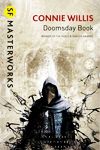Genre: Historical, Sci-fi
Rating: 6/10
Goodreads
 |
For Kivrin, preparing an on-site study of one of the deadliest eras in humanity's history was as simple as receiving inoculations against the diseases of the fourteenth century and inventing an alibi for a woman traveling alone. For her instructors in the twenty-first century, it meant painstaking calculations and careful monitoring of the rendezvous location where Kivrin would be received. |
Earlier in the year I read Blackout and All Clear by Connie Willis (review here) and while those books were definitely flawed I really enjoyed them and was really keen to read the other books in Willis' Oxford Time Travel series. Doomsday Book is the first of the books in this series and was originally published in 1993.
If I had to sum up my review of Blackout/All Clear it'd read: really loved it due to the characters and setting but I felt it needed much stricter editing, a better sense of temporal distance and a stronger emphasis on academia as the purpose of the time travel. Perhaps unsurprisingly most of my thoughts regarding Doomsday Book hang around the same issues.
- Editing: Once again it was too long. In terms of action hardly anything actually happens after the initial drop until about 60% of the way through. I appreciate the need to familiarise the audience with characters and to establish a sense of place and time but far too much time was spent on this set-up especially given the claustrophobic nature of the settings. Many of the scenes in contemporary Oxford could have been shortened or eliminated entirely.
- Setting: Willis did a good job in creating a sense of time and place but the C14 just doesn't peak my interest in the same way that modern history does. (This is obviously very subjective!) As the location of one of the main threads, C21 Oxford was slightly better established than in Blackout but there was still an insufficient sense of home - I don't think Kivrin ever mentioned her parents or having a life outside her studies.
- Characters: While Blackout was structured around 3 or 4 time-travelling characters, this narrative is more simply split between 'contemporary' Oxford and Kivrin's experience in C14. In theory, having fewer characters should mean that the protagonists should be better developed but this didn't seem to be the case. Kivrin, Mr Dunworthy and Colin are all easy enough characters to spend time with but none of them ever developed nuanced personalities or distinguishing traits. Both Colin and Mr Dunworthy appear in Blackout but I don't feel as if I know them any better having spent this story with them.
- Time-travel as historical inquiry: Doomsday Book was much better in presenting this idea than Blackout. There were transcripts of Kivrin's 'diary' recordings at the end of most of her chapters and she frequently notes differences between the existing historical record and what she is experiencing first hand.
This was a good book for commuting in and out of London last week as the repetition of the first 60% meant that it was easy to pick up for 20mins at a time but overall I was disappointed. I don't suppose Doomsday Book is any worse than Blackout but as I prefer C20 history to that of the C14, I enjoyed the latter much more. I'd definitely recommend the series to people who enjoy historical fiction and I probably will read the other book in the series at some point if only because I really love the concept of time-travelling historians!

No comments:
Post a Comment